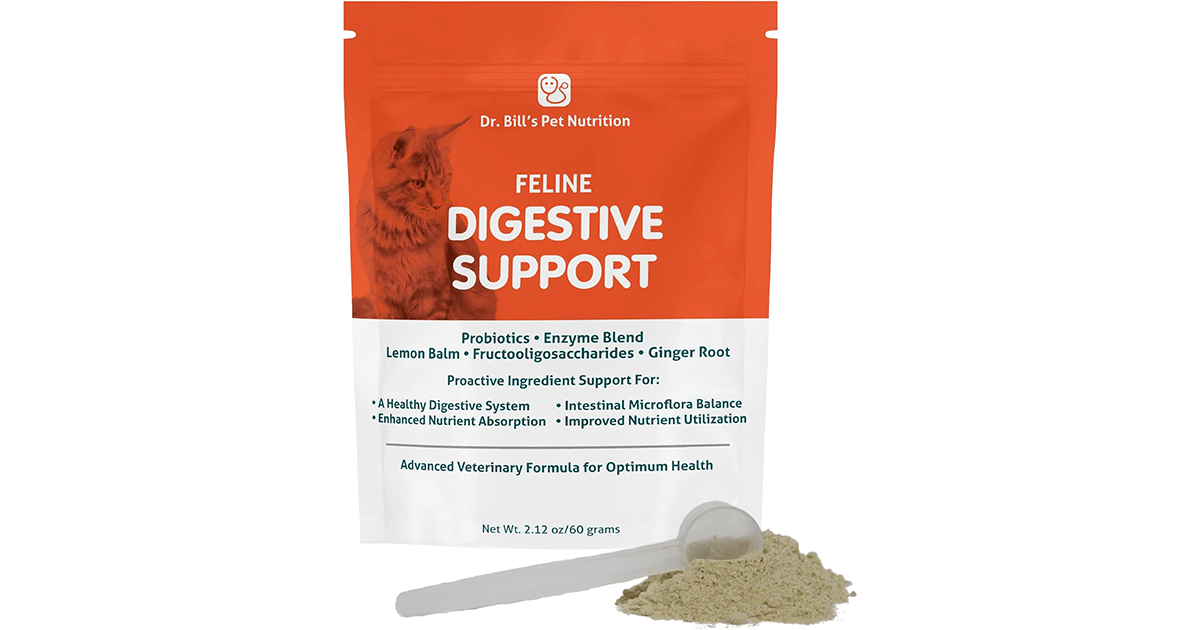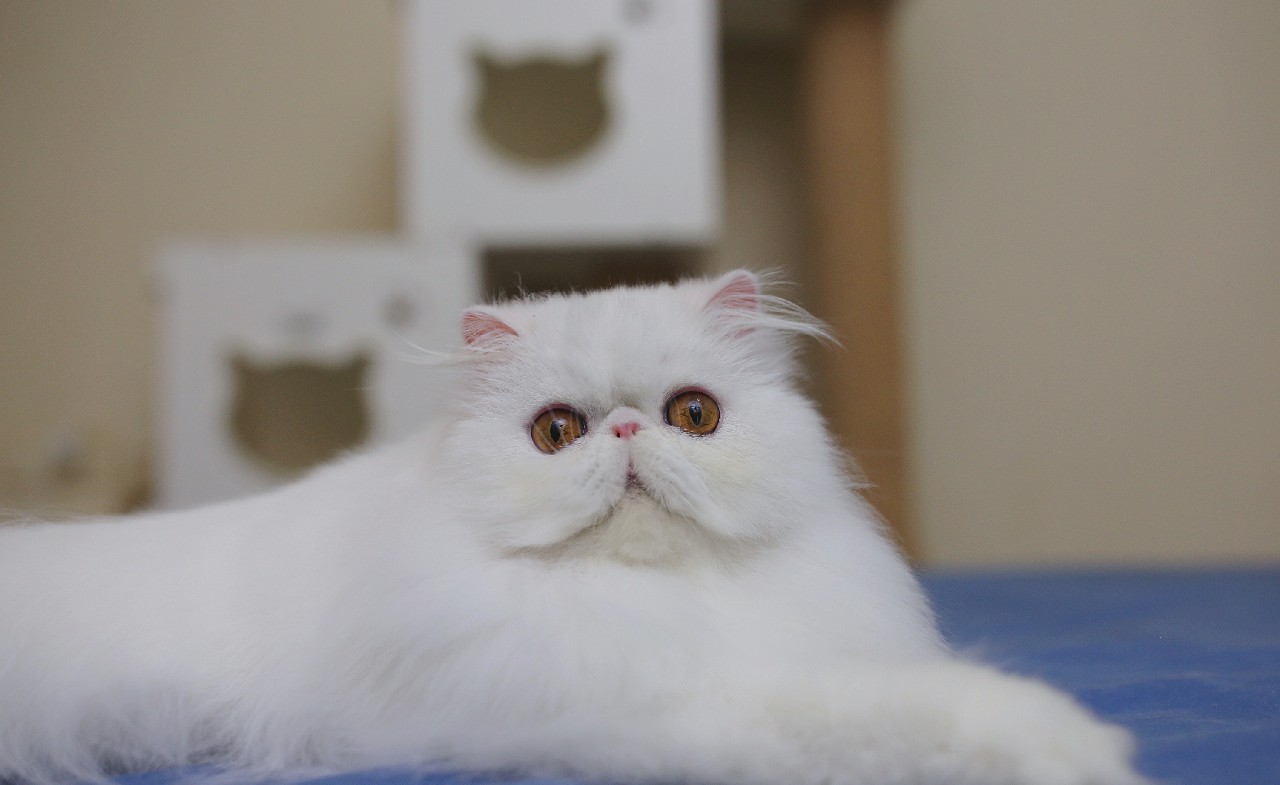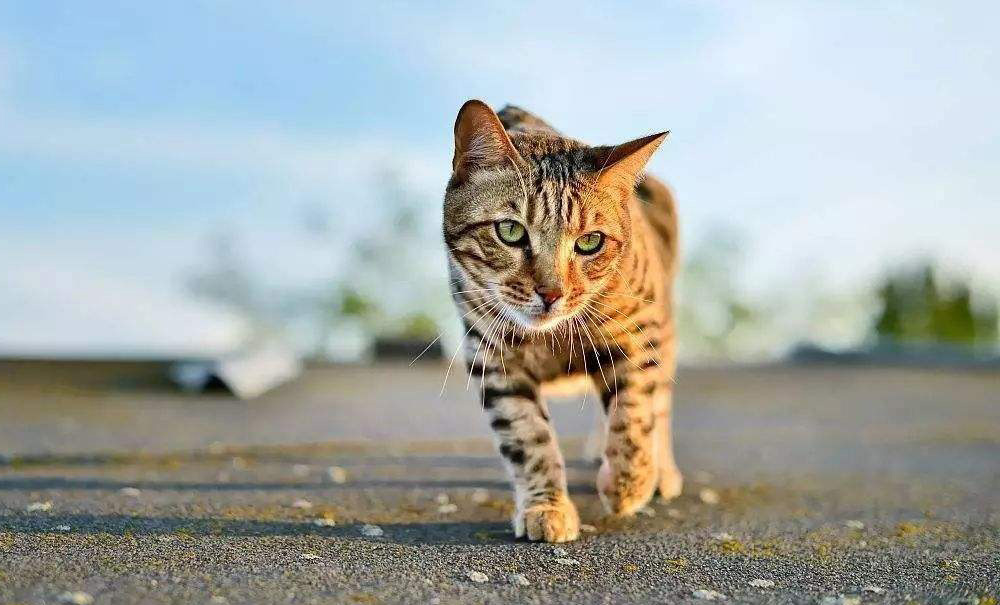Probiotics can be beneficial for all cats, but they are particularly important for rescued animals, including pregnant and feral mothers and their kittens. Street cats may have been exposed to disease-causing bacteria, making probiotics essential for their overall health.
When selecting a probiotic for your cat, it’s recommended to look for products specifically designed for cats. While some probiotics are suitable for both dogs and cats, there are also options available exclusively for cats. Both types should work effectively.
Ideally, choose a probiotic that is manufactured in the U.S.A. This ensures that the product meets certain quality and safety standards. Additionally, look for the NASC (National Animal Supplement Council) seal of approval on the packaging. This seal indicates that the product has undergone rigorous testing and adheres to high-quality standards.
It’s important to note that if your cat is experiencing digestive or other health issues, it’s always best to consult with your veterinarian. They can provide guidance on the most suitable probiotic for your cat’s specific needs.
To identify the best probiotics for cats, you can conduct research and consult with a veterinarian. Consider factors such as the delivery method of the probiotic (e.g., capsules, powders, or chews), NASC approval, and the number of active cultures. These factors can help you make an informed decision about the most appropriate probiotic for your cat.
Remember that probiotics are not a substitute for veterinary care, and it’s important to seek professional advice if your cat is experiencing any health concerns.
By incorporating a suitable probiotic into your cat’s routine, you can support their digestive health and overall well-being, especially if they are a rescued or feral cat with a higher likelihood of exposure to harmful bacteria.
Our top picks:
7 Best Probiotics for Cats
Best Overall – Dr. Bill’s Pet Nutrition Feline Digestive Support

Our top pick, Dr. Bill’s Feline Digestive Support, is a powdered supplement designed to support feline digestive health. It carries the NASC (National Animal Supplement Council) seal, indicating adherence to quality standards. The supplement is easy to dispense and flavored, making it more enjoyable for cats to consume.
Developed by veterinarian Dr. William Barnett, this supplement contains a blend of five strains of beneficial bacteria and eight digestive enzymes. These ingredients work together to aid in the breakdown of nutrients and minerals in a cat’s diet, promoting better digestion.
The formula also includes natural herbal remedies such as ginger root and lemon balm, which have been used for centuries for their potential health benefits. Psyllium husk, a dietary fiber component, is included to help maintain regular bowel movements and potentially assist with hairballs in long-haired cats.
Dr. Bill’s Feline Digestive Support incorporates beef, chicken, and whey protein isolates, as well as chicken liver, to enhance the flavor and make it more appealing to cats when mixed with their food.
It’s important to consult with your veterinarian before introducing this supplement into your cat’s diet, especially if your cat has known sensitivities to certain protein sources. Some cats may not tolerate the multiple protein sources used in this formula.
Pros:
- Includes digestive enzymes for improved nutrient breakdown
- Cats tend to enjoy the flavorful protein sources in the supplement
- Contains a blend of five strains of beneficial gut bacteria
Cons:
- Colony-forming units (CFU) count is not listed on the packaging, making it difficult to determine the potency of the probiotics
- Some cats may be sensitive to one or more of the multiple protein sources used
Best Budget – Pet Naturals of Vermont Daily Probiotic for Cats

The Pet Naturals of Vermont Daily Probiotic for Cats is a convenient daily treat option for cats who may resist powders added to their food. Priced at around $6 for a 30-day supply, it offers an affordable way to provide your cat with the benefits of daily probiotics.
Each chew contains 100 million colony-forming units (CFU) of a single strain of gut bacteria called Ganeden BC30 Bacillus coagulans. This strain is unique in that it forms spores capable of surviving the harsh stomach acids, allowing them to reach the intestinal tract where they can support healthy digestion.
In addition to probiotics, these duck-flavored chews also contain prebiotic fiber, Arabic gum, healing aloe vera gel, and are claimed to help improve bad breath. The treats are shelf-stable and can be kept in a cool, dry place for whenever your cat needs an extra digestive boost or if they haven’t received a full dose through another method.
Pet Naturals of Vermont is a woman-owned business, and the treats carry the NASC seal, indicating adherence to quality standards.
Pros:
- Cats tend to reliably eat these duck-flavored chews
- Affordable option for a 30-day supply
Cons:
- Contains only one strain of healthy gut bacteria
- Includes preservatives
Best for Constipation – PetUltimates Probiotics for Cats

If your cat is experiencing constipation, it’s crucial to consult with your veterinarian for proper diagnosis and guidance. Adding Pet Ultimates Probiotics for Cats to your pet’s diet may be a consideration to support their digestive health.
Each scoop of this supplement provides 5 billion colony-forming units (CFU) of 20 strains of live healthy gut bacteria. It also includes beta-glucan, a source of fiber, and alpha-galactocidase, a digestive enzyme that aids in breaking down natural sugars for improved digestion.
Manufactured in the U.S. in an FDA registered Good Manufacturing Practices (GMP)-compliant facility, this supplement aims to reduce litter box odors and promote firmer stools.
Pros:
- Contains 20 strains of live healthy gut bacteria
- Does not contain unnecessary ingredients that may cause sensitivity
- Backed by a 90-day money-back guarantee
Cons:
- Does not include prebiotics to support the growth of beneficial bacteria
Best for IBD – Fera Pet Organics USDA Organic Probiotics with Prebiotics

Inflammatory bowel disease (IBD) is a syndrome in cats that manifests as a collection of symptoms, including diarrhea or constipation. It is commonly diagnosed in middle-aged to older cats, typically between the ages of five and 12. Fera Pet Organic Probiotics with Prebiotics, containing 12 live powerful strains of beneficial bacteria, may aid in managing IBD symptoms.
Each scoop of Fera Pet Organic Probiotics provides 5 billion colony-forming units (CFU) of live bacteria. The flavorless powder can be easily mixed with your cat’s food without them noticing. The formula has been certified organic by the U.S. Department of Agriculture (USDA), and it includes plant-based ingredients such as gum arabic and inulin, which act as prebiotic fibers to support regularity in your cat’s bowel movements. Fructooligosaccharides (FOS) also function as a prebiotic, nourishing beneficial gut bacteria.
The recipe for this supplement was custom formulated by co-founding veterinarian Dr. Michelle Dulake. It is manufactured in FDA-registered Good Manufacturing Practices (GMP)-compliant facilities and carries the NASC seal, indicating adherence to quality standards. It is recommended to store the product in a cool, dry place for optimal shelf life.
Pros:
- Vegan, grain-free, and free from added colors, dyes, or preservatives
- USDA certified organic
- Contains 12 live strains of gut bacteria
Cons:
- Some cats may refuse to eat it
Best for Kidney Disease – Healthy Kidney Inc. Kidney Restore For Cats & Dogs

Kidney disease in cats can often go unnoticed until it has advanced, as cats tend to be quiet about their symptoms. If your cat is diagnosed with kidney disease, it’s crucial to consult with your veterinarian for appropriate treatment options. Healthy Kidney Inc.’s Kidney Restore for Cats & Dogs is a supplement that aims to support kidney health.
Formulated by naturopath Robert Galarowicz, Kidney Restore focuses on balancing five critical aspects of kidney health to reduce renal stress. The formula claims to address phosphorus and potassium balance, acid build-up, and toxin elimination. Each scoop of this supplement provides 50 billion colony-forming units (CFU) of seven strains of beneficial bacteria. It also includes fructooligosaccharides (FOS) and camu camu powder as prebiotics. Other ingredients include sodium bicarbonate to neutralize acids, niacinamide (vitamin B3) to lower harmful phosphorus levels, and vitamin C as an antioxidant.
Kidney Restore is organic, GMO-free, and manufactured and tested in an FDA registered Good Manufacturing Practices (GMP)-compliant facility in the United States. It can be easily mixed with food for administration. While some cat owners report that their cats refuse to eat it, many others have noticed significant improvements in their cat’s condition within a few weeks or less.
Pros:
- Contains seven strains of gut bacteria
- Addresses five different factors related to kidney health
- Backed by a money-back guarantee
Cons:
- Some cats may refuse to eat it
Best for Kittens – PetAg Bene-Bac Plus FOS & Probiotics Gel Supplement

Kittens rely on acquiring gut bacteria from their mother’s milk and their environment to develop a healthy gut. However, certain factors such as early separation from the mother, poor diet, or traumatic experiences can hinder the establishment of a healthy gut community in kittens. PetAg Bene-Bac Plus Gel Digestive Supplement is a solution designed to support their digestive health.
This digestive supplement is a combination of pro- and prebiotics and is conveniently packaged in a syringe for easy measuring and dispensing. Each gram of the gel contains 20 million colony-forming units (CFU) of seven strains of live healthy gut bacteria. The product is recommended by PetAg for various situations, including traveling, post-birth, after worming, at weaning, during boarding, post-surgery, during dietary changes, post-antibiotic therapy, and as advised by your veterinarian.
The sweet flavor of the prebiotic fructooligosaccharides (FOS) and sunflower oil in each dose makes it appealing to kittens. The syringe delivery method allows for precise measurement and the product can be stored at room temperature.
Pros:
- Syringe delivery method ensures quick and consistent dosing
- Contains seven strains of live bacteria
- Suitable for newborn kittens
Cons:
- Contains artificial color
Best Probiotic Deodorizer – Skout’s Honor Probiotic Deodorizer for Dogs & Cats
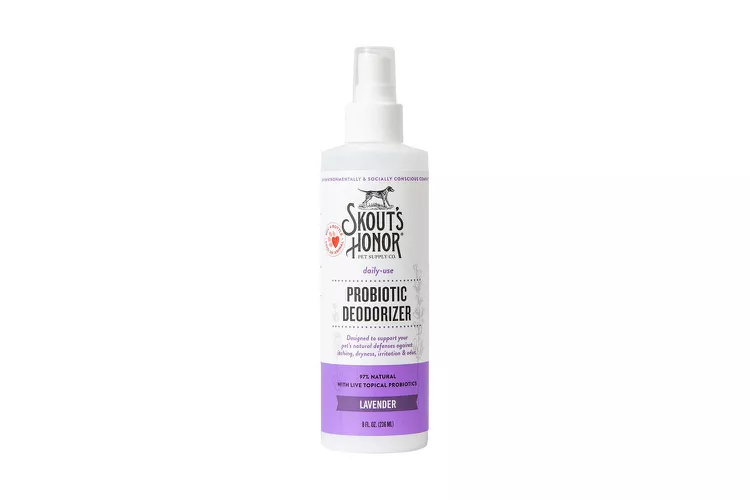
Skout’s Honor Probiotic Deodorizer is a product designed to promote a healthy microbiome on the surface of your cat’s skin. While the research on topical probiotics is still developing, the product aims to crowd out odor-causing bacteria, reduce dryness, and alleviate itching.
The deodorizer offers a hydrating and odor-reducing spray that can be used as needed. It contains natural ingredients such as avocado oil, which helps protect the skin. It is available in several scents, including Sandalwood Vanilla, Honeysuckle, Lilac & Linen, and Lavender. Additionally, an unscented hypoallergenic version is also available.
Pros:
- Variety of scents, including a hypoallergenic unscented option
- Safe for daily use
- Suitable for both cats and dogs
Cons:
- It is unclear if probiotics have any specific benefits in the context of a deodorizer
- Only available in one size
Read Also:8 Best Breakaway Cat Collars
What to Look for in Probiotics for Cats
When selecting probiotics for cats, it’s important to consider several factors to ensure you choose a high-quality product that is safe and beneficial for your feline companion. Here are some key things to look for:
- Strain Selection: Look for probiotics that contain specific strains of beneficial bacteria known to be effective for cats. The most commonly recommended strains for cats include Lactobacillus acidophilus, Bifidobacterium animalis, and Enterococcus faecium. These strains can help support a healthy digestive system in cats.
- Guaranteed Analysis: Check the label or product information for the guaranteed analysis, which provides details about the number of viable bacteria (colony-forming units, or CFUs) in each dose. Higher CFU counts are generally preferred, as they ensure a sufficient number of bacteria reach the cat’s digestive system to have a beneficial effect.
- Stability and Viability: Probiotic products should be formulated to ensure the viability and stability of the bacteria. Look for products that use techniques such as microencapsulation or freeze-drying to protect the bacteria from degradation and ensure they remain viable until consumed.
- Quality and Safety: Choose probiotics from reputable brands or manufacturers that follow strict quality control measures. Look for products that are manufactured in facilities that adhere to industry standards and have good manufacturing practices (GMP) certifications. Third-party testing or quality assurance programs can also be indicators of a reliable product.
- Additional Ingredients: Check the ingredient list to ensure there are no unnecessary additives, fillers, or potentially harmful substances. Some probiotics may include prebiotics, which are non-digestible fibers that help promote the growth of beneficial bacteria in the gut. Common prebiotics for cats include fructooligosaccharides (FOS) and inulin.
- Form of Administration: Consider the form of the probiotic that is most convenient for you and your cat. Probiotics for cats are available in various forms, such as powders, capsules, or chewable tablets. Choose a form that is easy to administer and that your cat will accept.
- Veterinary Recommendation: Consult with your veterinarian before selecting a probiotic for your cat. They can provide guidance based on your cat’s specific health needs and recommend a suitable product or brand.
Remember that probiotics are not a replacement for veterinary care, and it’s important to consult with your veterinarian if your cat has specific digestive issues or health concerns. They can provide proper diagnosis and guidance on the use of probiotics as part of your cat’s overall healthcare plan.
Do cats need a prescription for probiotics?
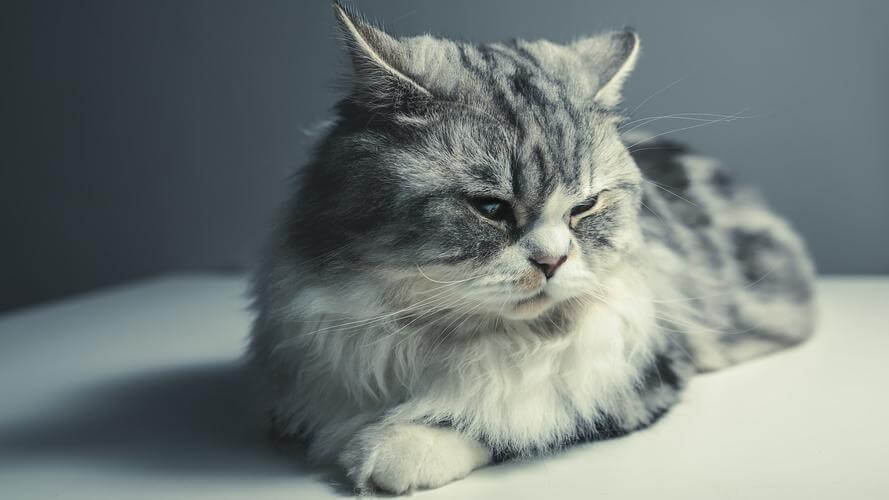
In most cases, cats do not need a prescription for probiotics. Probiotics are generally considered over-the-counter supplements and are widely available for purchase without a prescription. They are commonly found in pet stores, veterinary clinics, and online.
However, it’s always a good idea to consult with your veterinarian before starting your cat on any new supplement, including probiotics. Your veterinarian can assess your cat’s specific health needs and determine if probiotics are appropriate and beneficial for your cat’s condition.
In certain situations, such as when a cat has a specific gastrointestinal disorder or is undergoing treatment that affects the gut flora, your veterinarian may recommend specific probiotic strains or formulations that are available by prescription. These prescription probiotics may have a higher potency or be more targeted to address specific health concerns.
So, while most probiotics for cats are available without a prescription, it’s still important to involve your veterinarian in the decision-making process to ensure you choose the most appropriate product and dosage for your cat’s individual needs. They can provide personalized recommendations based on your cat’s health history and current condition.
Do probiotics have side-effects?
Probiotics are generally considered safe for cats, but in some cases, they can cause mild side effects. It’s important to note that these side effects are typically temporary and not severe. Here are some potential side effects that can occur when administering probiotics to cats:
- Digestive Upset: Some cats may experience mild gastrointestinal symptoms such as gas, bloating, or changes in stool consistency (e.g., softer stools or increased frequency). These symptoms are usually temporary and resolve on their own as the cat’s digestive system adjusts to the probiotics.
- Allergic Reactions: In rare cases, cats may have allergic reactions to specific strains or ingredients in probiotic products. Signs of an allergic reaction may include itching, hives, facial swelling, or difficulty breathing. If you notice any of these symptoms, discontinue the use of the probiotic and consult your veterinarian immediately.
- Immune Response: Probiotics work by interacting with the immune system, and in some cases, this interaction can lead to an immune response. This immune response can manifest as mild inflammation or an increase in immune activity. While this is generally not a cause for concern, if you notice any unusual or persistent symptoms, consult your veterinarian.
Can cats take probiotics made for humans?
While probiotics made for humans can have some similarities to those formulated for cats, it is generally not recommended to give human probiotics to cats without the guidance of a veterinarian. The bacterial composition and strains in probiotics designed for humans may not be the most suitable or effective for cats.
Cats have a unique gut microbiome, and their digestive systems differ from humans. Their specific dietary and nutritional needs, as well as the types and amounts of beneficial bacteria they require, may vary. Therefore, it’s important to choose probiotics specifically formulated for cats to ensure they receive the appropriate strains and dosages.
Additionally, human probiotics may contain ingredients or strains that are not well-tolerated or safe for cats. Some human probiotics may contain additives, flavorings, or other components that could be harmful to cats or cause adverse reactions.

